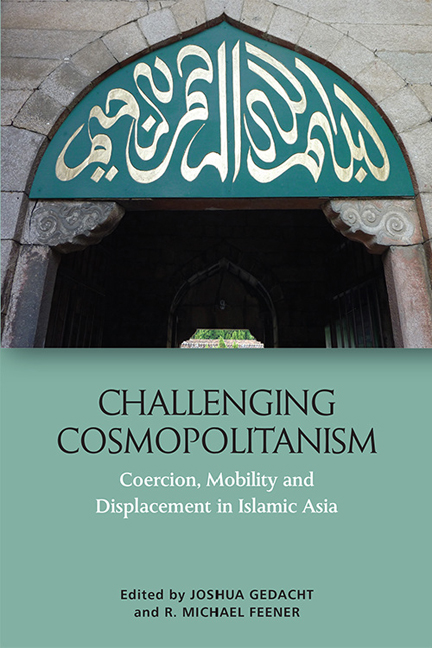Book contents
- Frontmatter
- Contents
- Preface
- 1 Hijra, Ḥajj and Muslim Mobilities: Considering Coercion and Asymmetrical Power Dynamics in Histories of Islamic Cosmopolitanism
- 2 Islamicate Cosmopolitanism from North Africa to Southeast Asia
- 3 Sufi Cosmopolitanism in the Seventeenth-century Indian Ocean: Sharīʿa, Lineage and Royal Power in Southeast Asia and the Maldives
- 4 The White Heron Called by the Muezzin: Shrines, Sufis and Warlords in Early Modern Java
- 5 Variations of ‘Islamic Military Cosmopolitanism’: The Survival Strategies of Hui Muslims during the Modern Period
- 6 Writing Cosmopolitan History in Nineteenth-century China: Li Huanyi’s Words and Deeds of Islamic Exemplars
- 7 The ‘Shaykh al-Islām of the Philippines’ and Coercive Cosmopolitanism in an Age of Global Empire
- 8 Bordering Malaya’s ‘Benighted Lands’: Frontiers of Race and Colonialism on the Malay Peninsula, 1887–1902
- 9 Afghanistan’s Cosmopolitan Trading Networks: A View From Yiwu, China
- Notes on the Contributors
- Index
3 - Sufi Cosmopolitanism in the Seventeenth-century Indian Ocean: Sharīʿa, Lineage and Royal Power in Southeast Asia and the Maldives
Published online by Cambridge University Press: 01 May 2021
- Frontmatter
- Contents
- Preface
- 1 Hijra, Ḥajj and Muslim Mobilities: Considering Coercion and Asymmetrical Power Dynamics in Histories of Islamic Cosmopolitanism
- 2 Islamicate Cosmopolitanism from North Africa to Southeast Asia
- 3 Sufi Cosmopolitanism in the Seventeenth-century Indian Ocean: Sharīʿa, Lineage and Royal Power in Southeast Asia and the Maldives
- 4 The White Heron Called by the Muezzin: Shrines, Sufis and Warlords in Early Modern Java
- 5 Variations of ‘Islamic Military Cosmopolitanism’: The Survival Strategies of Hui Muslims during the Modern Period
- 6 Writing Cosmopolitan History in Nineteenth-century China: Li Huanyi’s Words and Deeds of Islamic Exemplars
- 7 The ‘Shaykh al-Islām of the Philippines’ and Coercive Cosmopolitanism in an Age of Global Empire
- 8 Bordering Malaya’s ‘Benighted Lands’: Frontiers of Race and Colonialism on the Malay Peninsula, 1887–1902
- 9 Afghanistan’s Cosmopolitan Trading Networks: A View From Yiwu, China
- Notes on the Contributors
- Index
Summary
Sufi networks have been seen as constituting one of the prime means through which cosmopolitanism in a variety of senses was articulated in the pre-modern Islamic world. In emulation of the Prophetic ḥadīth, ‘seek knowledge though it be in China’, travel was one of the key duties of the Sufi, both in theory and in practice, and Sufi literature was permeated with the vocabulary of voyaging. Through shared texts, holy men and genealogies both spiritual and blood, ṭarīqas bound together the Islamic world in a way that political and commercial links never rivalled. Itinerant holy men criss-crossed the dār al-Islām, and from an early date some specifically sought out contested zones on the border with non-Muslims, far from the urban centres of Islamic civilisation, to devote themselves to contemplation and holy war.
As a type of religiosity that thrived on these contested peripheries, Sufism has often been characterised as especially receptive to non-Muslim influences, which for some modern scholars constitutes a form of cosmopolitanism. This presumed aspect of Sufism is often seen as underlying its alleged role in converting non-Muslim populations, by providing a sort of common ground whereby pre-Islamic practices could be incorporated into a Muslim society. One scholar has written that analysis of Sufism in the Indian Ocean is ‘more apt to speak of an acceptance of Islamic practices into pre-Islamic cosmology and customs rather than conversion to a new orthodoxy’. However, as Nile Green has put it, ‘to a very large extent, Sufism was Islam in its medieval form’ and it cannot easily be detached from other forms of Islamic piety. Sufi Islam encompassed a wide variety of practices, the distinctive unifying component being a belief in the efficacy of the blessing power (baraka) of holy men. Thus, whatever the reasons for the widespread appeal of Sufism to Muslims and converts throughout post-classical Islamic history, it would be wrong to assume that it was in any uniform sense especially (or at all) accommodating to pre-Islamic practices.
If claims that Sufism is cosmopolitan by virtue of openness to other religions are questionable, so is the idea that travel necessarily engenders cosmopolitanism, except perhaps in a very limited sense where it becomes little more than a synonym for itinerancy
- Type
- Chapter
- Information
- Challenging CosmopolitanismCoercion, Mobility and Displacement in Islamic Asia, pp. 53 - 80Publisher: Edinburgh University PressPrint publication year: 2018



